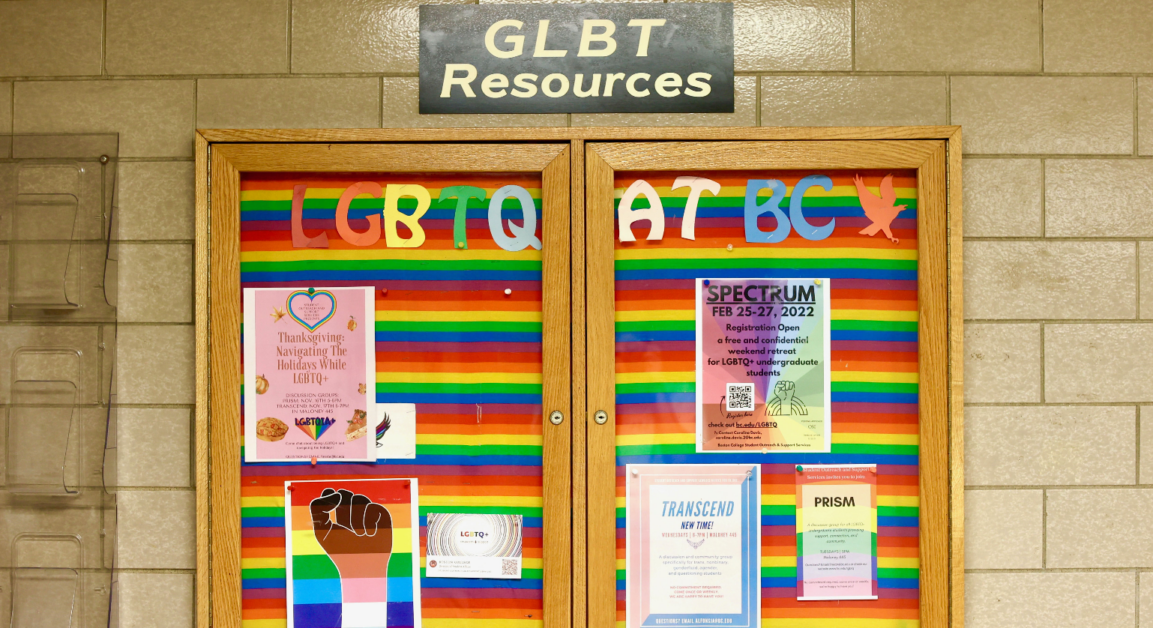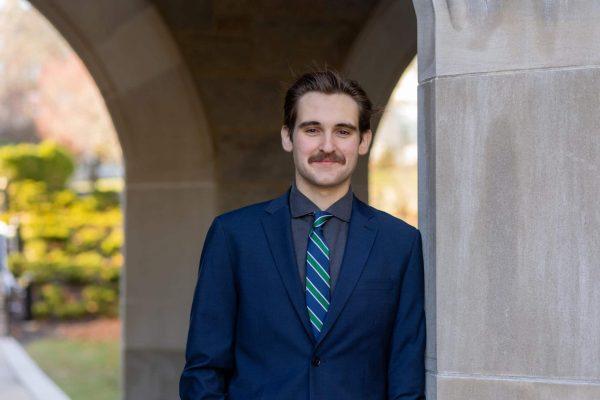A few hundred feet beyond the Green Line’s Amory Street T stop, Boston University is set to open a new LGBTQIA+ student resource center at 808 Commonwealth Ave.
The center is the result of an eight-month campaign from the LGBTQIA+ BU Student Task Force, which first submitted its proposal to create a space specifically for queer students in November. Opening at the beginning of the 2023–24 academic year, the new center will aim to “offer programming, dialogues, intersectional community building, and other resources.”
Just a few miles down the road, UGBC’s Student Assembly (SA) passed a resolution on Tuesday night reaffirming its support of proposals to create an LGBTQ+ resource center at Boston College. This is only the latest effort in a long history of students advocating for such a space.
According to Wells Arkins, GLBTQ+ Leadership Council (GLC) chair and MCAS ’23, the University has rejected student calls for an LGBTQ+ resource center for reasons ranging from a lack of physical space to insufficient funds.
But the explanation most frequently given, according to Arkins, is not destinations or dollars: It’s doctrine.
The Catechism of the Catholic Church states that sexual relations between members of the same sex are contrary to natural law and cannot be sanctioned under any circumstances.
“The most common reasoning is, of course, citing Jesuit Catholic values: that it does not align with the Church’s view,” he said.
About Two Decades of Proposals
In May of 2005, the UGBC Senate approved a resolution to convert its McElroy Commons satellite office into a student-run LGBTQ+ resource center.
By that September, however, the University abruptly halted UGBC’s plans for the center, citing a failure to seek approval from the Office of Space Management.
“Anyone that wants to use space has to go through a specific process,” former Dean of Student Development Robert Sherwood said to The Heights at the time. “They didn’t have the authority to assign that space.”
Initiatives for a resource center were not revived until 2010, when Kelsey Gasselling, former GLC president and BC ’11, introduced GLC’s 10-year plan that included the addition of an on-campus resource center.
After the initiative’s progress stalled, a group of graduating seniors and BC alumni launched the “For Here All Are One” campaign in April of 2015, calling on the University to provide more resources for LGBTQ+ students.
The campaign included a petition signed by over 400 students and alumni pledging to withhold donations to BC until it established an LGBTQ+ resource center.
“It is time we address the troubling reality that students who identify as gay, lesbian, bisexual, transgender, queer, questioning or elsewhere on the spectrum are not properly supported by this institution,” wrote Nanci Fiore-Chettiar, BC ’15, in a letter included in the petition.
Tom Mogan, dean of students at the time and current interim associate dean of MCAS, said administrators within the Office of the Dean of Students were surprised that students decided to help create a petition rather than continue conversations between the University and UGBC.
“In terms of the resource center, we do not feel that a dedicated center is necessary to demonstrate our support for students who identify as LGBTQ,” Mogan said in an email to The Heights in response to the petition.
A year later, UGBC’s Student Assembly voted 15–2 to call upon the University to establish an LGBTQ+ resource center and create a steering committee to advance the initiative with administrators. The resolution came a week after the letters of a parking sign in the Mod Lot were rearranged to partially read “NO F—S.”
The following month, Associate Vice President for University Communications Jack Dunn said in an interview with The Heights that while BC is dedicated to the needs of its students, it is still obligated to uphold the tenets of the Catholic faith.
“Sometimes those commitments can be unpopular and seem greatly out of touch with the times,” he said at the time. “As with any Catholic university in the United States, we grapple with how best to meet those dual obligations.”
As 2020 rolled around, initiatives to create a resource center still had not developed. Joy Moore, the former vice president of student affairs and current University vice president and executive director of the Pine Manor Institute for Student Success, stated in an email to The Heights at the time that establishing a center was “not a current university priority.”
A petition started that same year calling for BC to establish an LGBTQ+ resource center and has received almost 1,700 signatures by this story’s publication, including those of former Boston Mayor Marty Walsh, BC ’09, current Boston Mayor Michelle Wu, and other local politicians.
The 2021 Proposal
When Shawna Cooper Whitehead first joined BC as vice president for student affairs in the fall of 2021, Chris Rizzo, former GLC chair and BC ’22, said he saw a renewed opportunity to bring a resource center to campus.
“We asked for a meeting with her and showed her our proposal,” Rizzo said. “She was really gung-ho, she’s like, ‘I’m gonna make things better for queer students, this proposal is really great, I’m absolutely going to talk to higher administrators and see why this was stopped.’”
Cooper Whitehead did not respond to an email requesting comment on the details of this alleged meeting with Rizzo and Aneesa Wermers, GLC vice chair and LSEHD ’24.
Rizzo said he and GLC received no update on the proposal until a follow-up meeting with Cooper Whitehead and Vice President of the Division of Mission and Ministry Rev. Jack Butler, S.J., several months later.
“So it was [Butler] and Shawna, and, you know, within about five minutes of the meeting happening, Shawna was like, ‘Okay, so the Resource Center is not going to happen,’” Rizzo said.
According to Rizzo, Butler and Cooper Whitehead said the University was rejecting the proposal due to a lack of space and funds as well as BC’s Jesuit values.
Butler did not respond to an email requesting comment on the details of the alleged meeting with Rizzo and Wermers.
“They would rather a queer student receive counseling through University Counseling Services or be a part of Campus Ministry … as opposed to being in a space where our identities are recognized and where we can form relationships with each other and connect and discuss our experience that way,” Rizzo said.
Arkins said there is no paper trail of the administration’s rejections of these resource center proposals.
“The thing is, it’s never written—never a written rejection,” Arkins said. “It’s almost always verbal. And I’ve actually been pushing to get written responses on all of this, but that just hasn’t been happening.”
According to Arkins, University President Rev. William P. Leahy, S.J., likely has the final say regarding whether BC can establish a resource center.
“Usually these things go up to Father Leahy, and it’s ultimately his discretion whether or not these things happen,” Arkins said.
The University did not respond to an email request inquiring about Leahy’s role in resource center proposals.
A New Step Forward: The Integrated Resource Center
Last spring, the University announced it would rebrand the Thea Bowman AHANA Intercultural Center (BAIC) as the Thea Bowman Intercultural Center starting the summer of 2022, dropping the AHANA acronym from the center’s name and incorporating resources for LGBTQ+ students under its umbrella.
Cooper Whitehead later paused the plan after hearing feedback from students, alumni, and members of color on BC’s Board of Trustees, according to a University release.
In an email to The Heights earlier this month, Dean of Students Corey Kelly and Cooper Whitehead shared that the integration of queer resources into the BAIC was ongoing and that the changes would bring more resources to campus.
“The BAIC has a particular focus on supporting students of color and LGBTQ+ students, and following a model used at many universities, the BAIC aims to be an integrated intercultural center that allows students to be served across their various identities,” the joint statement read.
As a part of the restructuring, the Division of Student Affairs is currently in the process of hiring an associate director of intercultural programming for the BAIC, a position specifically tasked with creating programming, providing support, and coordinating resources for LGBTQ+ students on campus.
“I think this is actually a good opportunity for queer students on this campus because even though we know we won’t get like an explicit Queer Resource Center, it is offering that space,” Arkins said.
Despite this, Arkins said he is concerned that integrating the resources for two different identity groups within the BAIC will take up an already limited space for students of color.
In the University’s initial announcement of the BAIC’s rebranding, Cooper Whitehead said that an integrated multicultural center—rather than one that just serves one identity group—is consistent with the model used by other universities.
BU utilized this model as well, housing multifaceted student support in the Howard Thurman Center for Common Ground before the LGBTQIA+ student resource center was approved.
But the benefits of that center, including providing students with a space to come together and discuss their different identities, do not outweigh the specific, individualized needs of identity groups on campus, according to Christa Rose, co-founder of the LGBTQIA+ Boston University Student Task Force.
“There’s also a further perpetuation of the invisibility of marginalized students who need and deserve that direct tailored support,” Rose said. “It also kind of creates a scarcity mindset, like, all the marginalized students are fighting to get support and resources from this one center.”
Paul Poteat, a BC professor of psychology whose research focuses on school-based experiences of sexual and gender minorities, said that a space exclusively designed for LGBTQ+ students poses some benefits.
“It’s often valuable to have a space that people know they can go to that’s reserved and constant and somewhere where they can access resources, connect with others, network, feel affirmed, and know that it’s explicitly an affirming space for them,” he said.
But, Poteat added that separating different identity-based groups into specific individualized spaces may limit solidarity.
“There are other parts of your identity that you bring in, and the concern might be that if you compartmentalize each and every one of these in and of themselves, in some ways, you know, it could potentially limit solidarity or joining together and working together more broadly,” Poteat said.
Kris Berg, the other co-founder of BU’s LGBTQIA+ Student Task Force, said the ideal resource center would offer support to specific identity groups while recognizing and addressing the intersectional identities that people hold.
“Having a center and having identity-based support is super important,” Berg said. “But it’s also important for universities to understand that, you know, LGBTQ+ student support must be multifaceted.”
Ongoing Advocacy
Following roughly two decades of advocacy, BC students continue to call for a resource center.
Some Catholic institutions have established LGBTQ+ resource centers, with Georgetown becoming the first to do so in 2008. Santa Clara University and Marquette University both followed suit in 2011 and 2015, respectively. Other universities like Boston College, Duquesne University, and Brescia University, however, do not have resource centers.
Arkins said that a specific LGBTQ+ resource center, as opposed to an integrated center, “will always be the end goal.”
“Under the current administration, I don’t think that’s possible,” Arkins said. “And by that, I will directly think that under Father Leahy, his administration of the school, I don’t think that is under the realm of possibility at this time.”
Even so, Arkins said that GLC will continue to advocate for it.
“I think it’s still important that we continue to push for that and make sure that for any minoritized group on campus, they have a dedicated resource center dedicated to them and only them,” Arkins said.




















